Ok to Give Raw Baby Back Ribs to Dogs
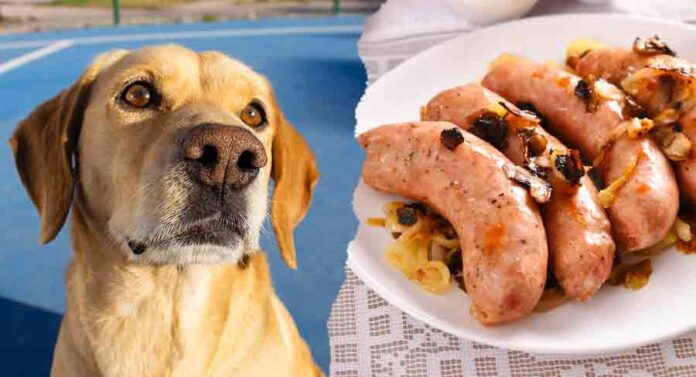
Today we are going to look at how to safely prepare pork for your dog to eat. We'll let you know how much they can have, if cooked or raw is better, and whether it's okay to give them pork bones.
Can dogs eat pork? Dogs are carnivores, so it's natural to assume it's safe to feed them meat. But not all meat is equal. Some types of meat can be dangerous to dogs. So, can dogs eat pork safely? The answer is yes and no. Dogs can eat cooked, unseasoned, pork in moderation. But too much can be bad for them. And raw or undercooked pork can carry a parasite that causes serious illness in dogs.
Can Dogs Eat Pork?
Is pork safe for dogs? Can dogs have pork bones? Dogs are commonly viewed as carnivores, and therefore owners usually do not question feeding their furry friends meat. However, there are different health benefits and risks associated with feeding your dog different types of meat.
Dogs can eat cooked pork safely in moderate quantities. It provides them with quality protein and B12, both of which are necessary for the maintenance of healthy muscles and a number of other important bodily processes. Pork is made up of, well, pork! More specifically, pork is almost completely made out of protein. In fact, it contains about 81% protein, with the rest being fat.
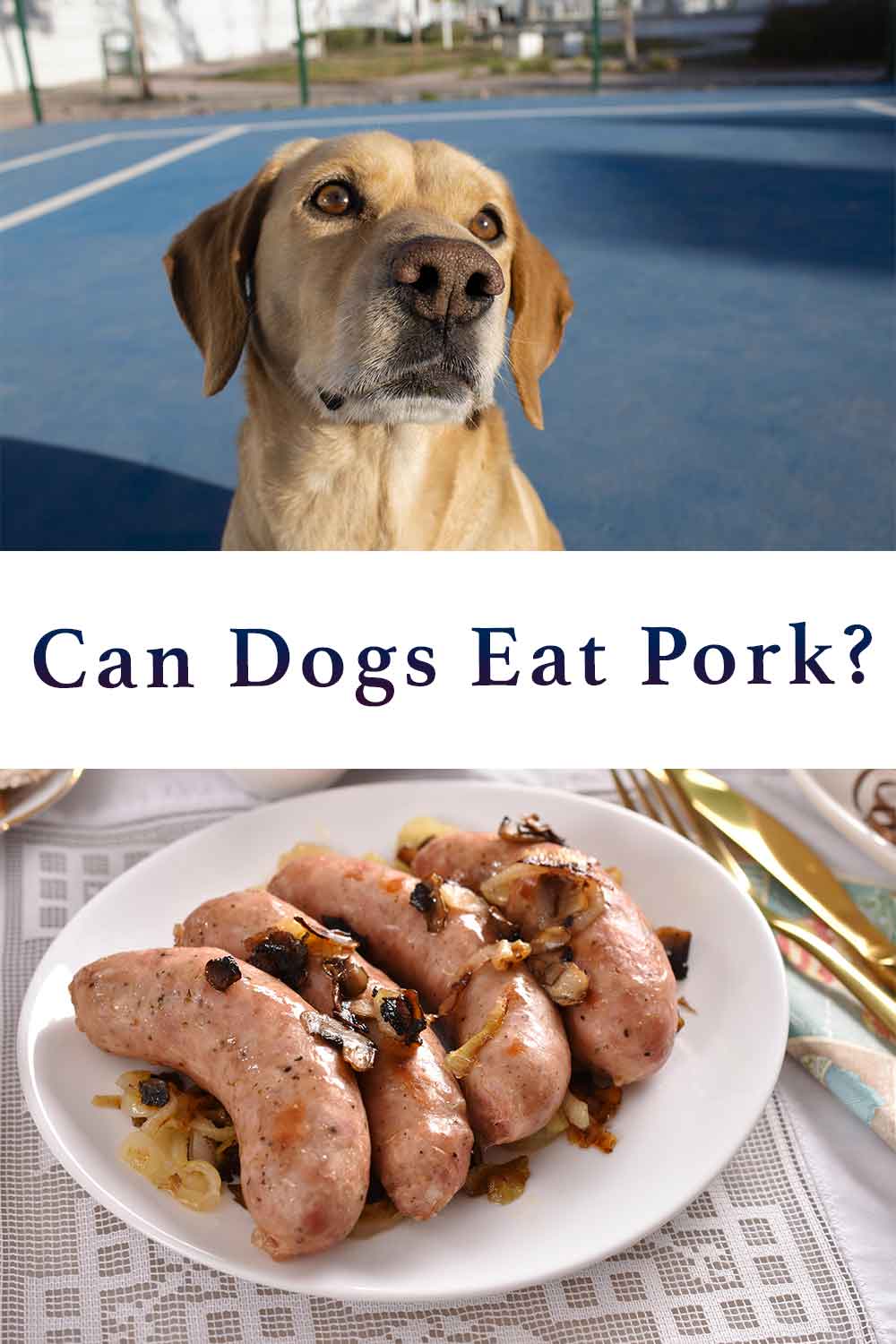
Dogs And Pork
Dogs do require a lot of quality protein in their diet. And most dog foods contain animal protein. However, chicken and beef tend to be the most common animal protein sources found in commercial dog food. Why is that? Despite all its nutrients, is pork bad for dogs?
Pork is actually safe for dogs in limited quantities. It provides some essential nutrients that dogs need and also has a high protein content. So, dogs can eat cooked, unseasoned pork. However, pork has a higher fat content than chicken or lean beef. And too much fat can cause digestive issues and health problems in dogs. While dogs can eat pork, they are better off eating leaner proteins as the main component of their diet.
Is Pork Good For Dogs?
Pork is a decent source of vitamin C, niacin, phosphorus, and zinc. It is also a very good source of vitamin B12, iron, and selenium. Dogs need a diet with plenty of protein, and protein is something that pork certainly has in spades. However, pork also has a high-fat content, which makes it more difficult for dogs to digest. As a result, too much pork can lead to certain health issues. So pork should not be the main protein source for your dog.
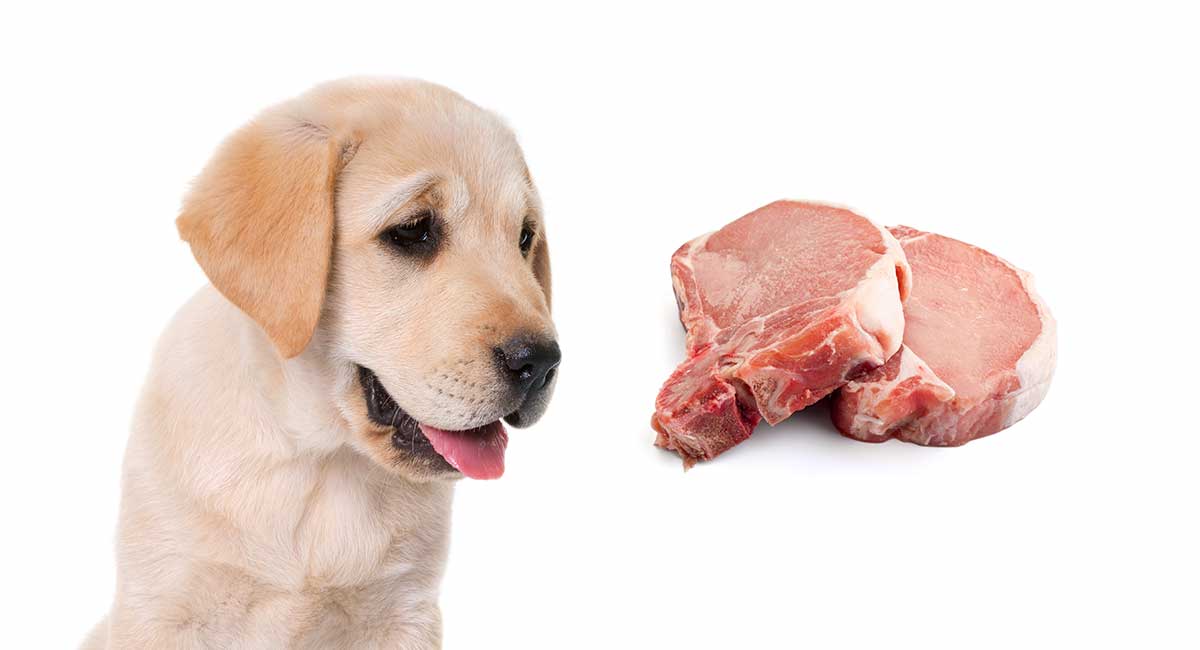
When Is Pork Bad For Dogs?
Pork can come in different forms and preparations and so can pork bones. Not all variations of pork are safe for dogs to eat. Raw and undercooked pork is dangerous to dogs as they can potentially cause trichinosis, a condition that can result when the meat is infested with the larvae of a parasitic worm called Trichinella spiralis. Puppies and older dogs, in particular, are more at risk.
Symptoms And Precautions
Symptoms of this condition include upset stomach, vomiting, diarrhea, elevated fever, lethargy, muscle inflammation, pain, and stiffness. If your pet has a weakened immune system, due to a previous disease, for example, it could increase the chances of their getting infected. Due to this reason, it is always important to cook the pork well before giving it to your pooch. Cooking the meat kills this parasite and prevents your dog from contracting it.
How Do I Know If My Dog Has Eaten Too Much Pork
As we will establish in this article, in some respects, pork fits in pretty well to a dog's diet. It matches a dog's preferred level of carbs and protein. Plus, it also contains a number of nutrients that are very helpful in a dog's diet. However, with that said, there is a high-fat content in pork. Too much fat in a dog's diet can cause digestive issues and can also lead to inflammation and pancreatitis.
It's always best to be attentive to changes in your dog's behavior or digestion. It may not be directly because of pork, but it's always recommended to get in touch with your vet if things don't seem to be running as normal. Pork is best served to your pooch infrequently and in small portions.
Can Dogs Eat Pork Bones?
Can dogs eat pork bones? The stereotypical image of a dog with a bone can be a bit misleading. Not all bones are safe for dogs, so let's address the questions, "Can dogs have pork bones?" This is a complex question for a number of reasons. On the one hand, natural, unprocessed pork bones are okay for your pooch. However, it isn't safe to feed your dog raw pork. Plain, cooked pork is safe for dogs, but the bones certainly are not.
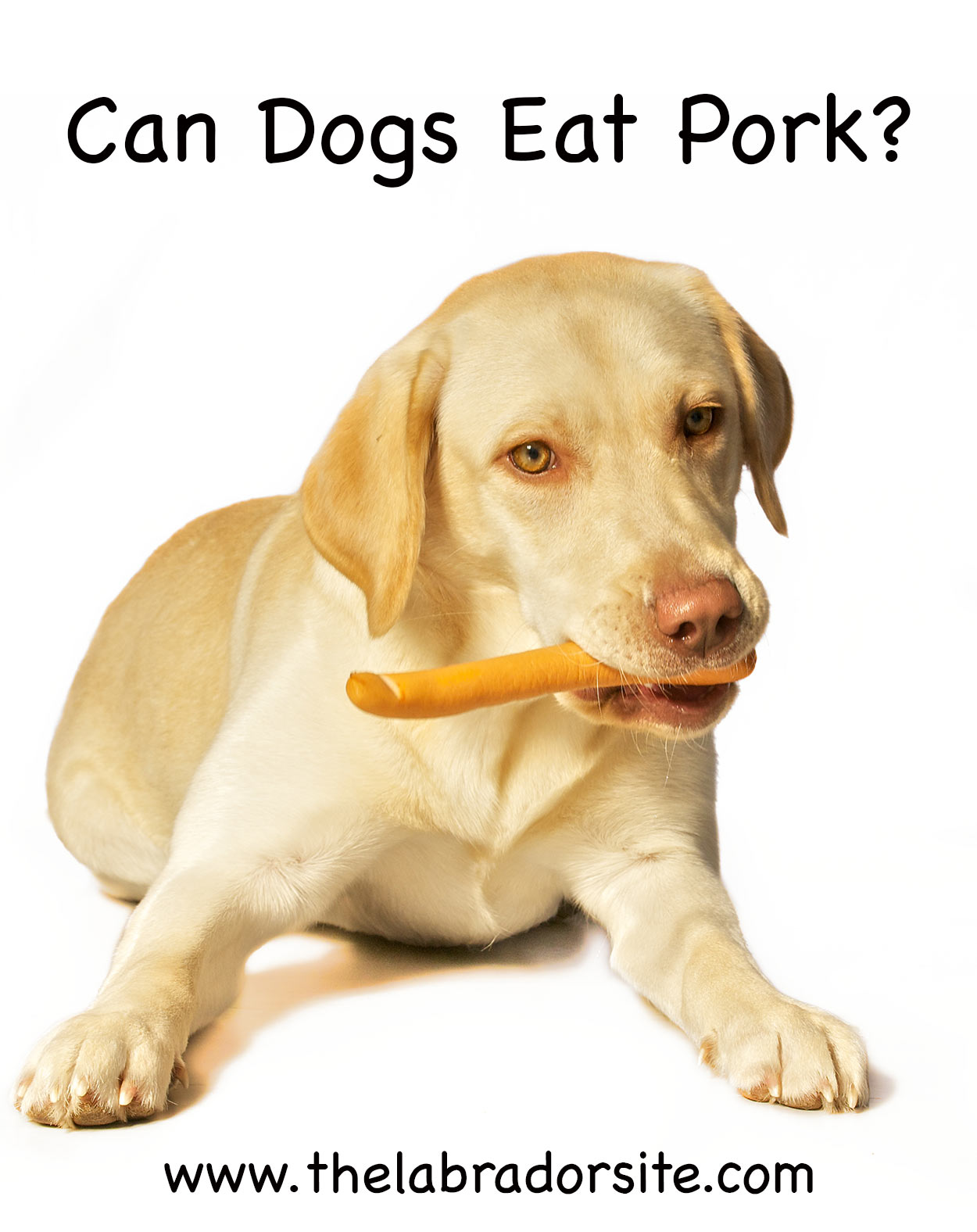
Can Dogs Eat Cooked Pork Bones?
It's tricky answering the question, "Can dogs eat pork bones?" In short, the act of cooking bones dries them out and can cause them to become fragile and break. This can create tiny bone-splinters that can cause damage to your pup's mouth and digestive tract. They are a choking hazard, in addition to potentially causing obstructions or perforations in your dog's digestive tract. So, can dogs have pork bones? Absolutely not.
Can Dogs Eat Pork Ribs?
Does your dog look up at you longingly as you savor a plate full of tender, juicy ribs? Have you thought about giving your furry companion a taste and wondered, "Can dogs have pork rib bones?"
Tempting as it is to share your yummy treat, you'll have to resist the urge. Just like all other pork bones, pork rib bones are dangerous for dogs. They will also splinter and cause damage to your dog's mouth, throat, or intestines. The answer to the question, "Can dogs eat pork rib bones?" is the exact same as, "Can dogs have pork bones?" ie., no.
Can Dogs Eat Pork Chops?
Pork chops are a favorite treat for a lot of us, but again the question is, "Can dogs eat pork bones?" If the chops are boneless, without added flavoring, it is safe for your dog to eat in small quantities.
My Dog Ate A Pork Bone! What Do I Do?
If you realize that Fido has stolen a bone from your plate, don't panic. Look for any immediate signs of distress, such as choking. If your dog is in any distress, call your veterinarian right away, explain what happened, and follow instructions.
On the other hand, if your dog doesn't appear to be any the worse for wear, keep a close eye on him and watch for any developing signs. You may also choose to call your vet anyhow, just to let them know what's going on and ask for advice.
If your dog shows signs of unusual behavior, even if he doesn't seem to be in immediate pain, it's best to take him into the vet and have him examined. If the pork bones make it through the digestive process, it will take about 48 hours for them to pass.
Can Dogs Eat Cooked Pork?
Can dogs have pork if it's well-cooked? The answer here is yes, but there are some caveats to this. The pork should, again, be given only in moderation. And you should avoid feeding your dog pork with added flavoring and seasoning. We'll get into some of the specifics shortly.
Can Dogs Eat Raw Pork?
What about raw pork for dogs? As mentioned earlier, uncooked pork can potentially cause trichinosis, which is a dangerous health hazard. The answer to, "Can dogs eat raw pork?" is definitely, "No!" Never feed your dog or any other animal uncooked pork. Contact your veterinarian if your dog happens to get their paws on some raw pork. There are tests that can determine if your dog has trichinosis. Watch for signs like vomiting, diarrhea, fever, lethargy, or muscle inflammation.
Can Dogs Eat Pork Sausage?
While plain pork is okay for your dog to eat, pork sausage, which is usually mixed with salt and seasonings, or pork covered in spices or sauce is not. Many spices are actually toxic for dogs, including onion, garlic, and nutmeg. These can cause a very serious reaction if consumed by your pooch.
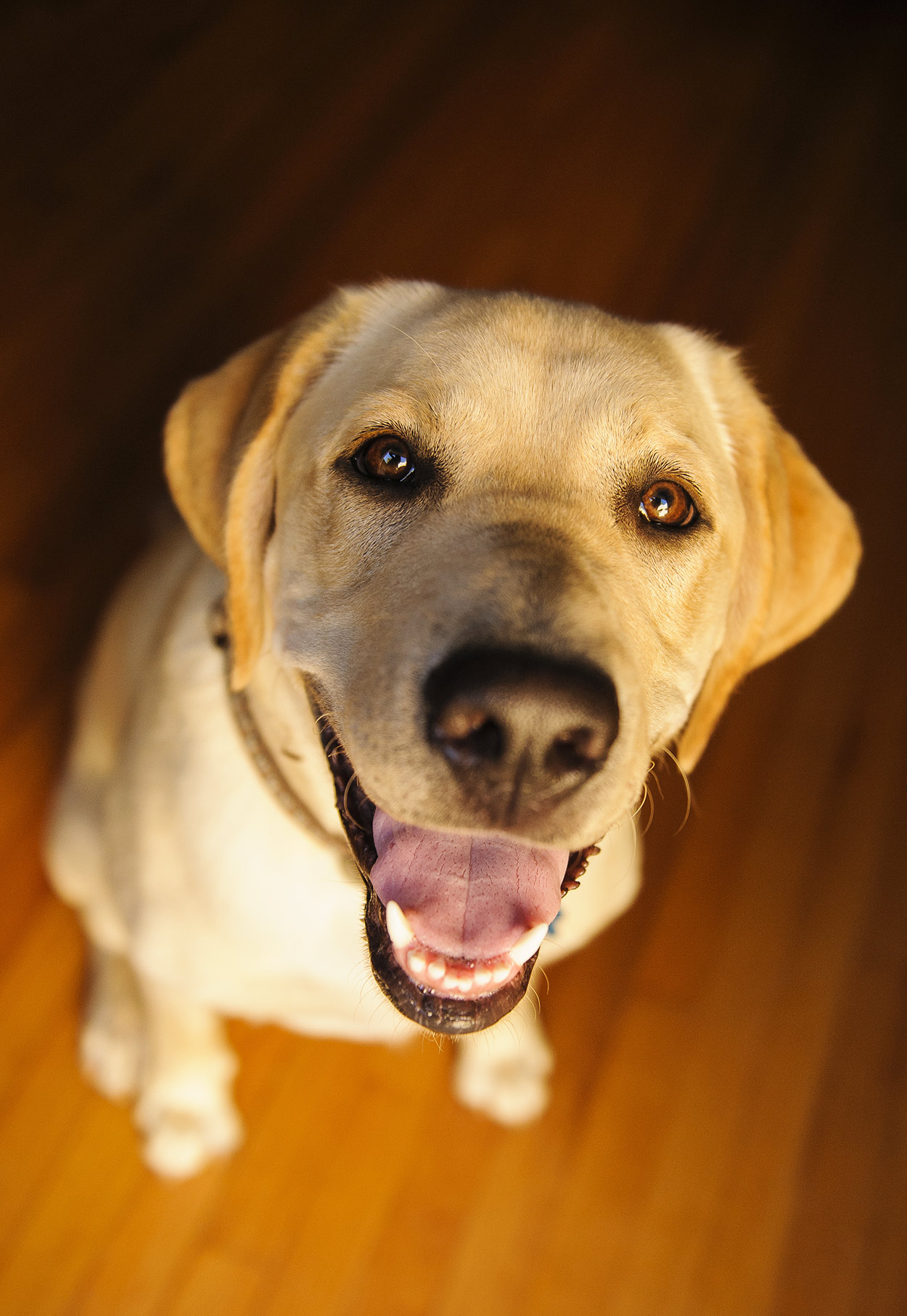
Can Dogs Eat Pork Rinds And Bacon?
Bacon has a high sodium content and is quite fatty, so it is not good for your dog. Large amounts of fat can lead to a life-threatening condition called pancreatitis. Salt is also dangerous as it can be toxic to dogs. It can cause vomiting, diarrhea, fluid build-up, and excessive thirst. It can even cause kidney damage, seizures, and possibly death.
Bacon and other salty cured pork products such as pork rind are a no-no for your pooch, no matter how much they look up at you with those pleading, puppy dog eyes.
Can Dogs Eat Pork Skin?
Pork skin really falls under the same category as pork rinds. While not immediately hazardous to your dog in small quantities, it is often fried and with salt added, which is not healthy for your pup. So, as with bacon and pork rinds, you don't have to worry if your dog gets to a dropped piece before you do. But it's best not to make it a regular treat.
Can Dogs Eat Pulled Pork?
Pulled pork is a perennial favorite, especially in the summer. But it usually involves barbecue sauce, and barbecue sauce often has seasoning such as onions and garlic. Both of these are not good for your dog. Additionally, there's usually quite a bit of sugar in barbecue sauce, which can be bad for your pup. For this reason, it is best to opt to only feed your dog unseasoned pork with absolutely no sauce.
If your pooch does consume pork with spices on it, it is important to keep a close eye on them for a reaction. You should contact your vet as soon as possible if you notice any strange behavior in your pet.
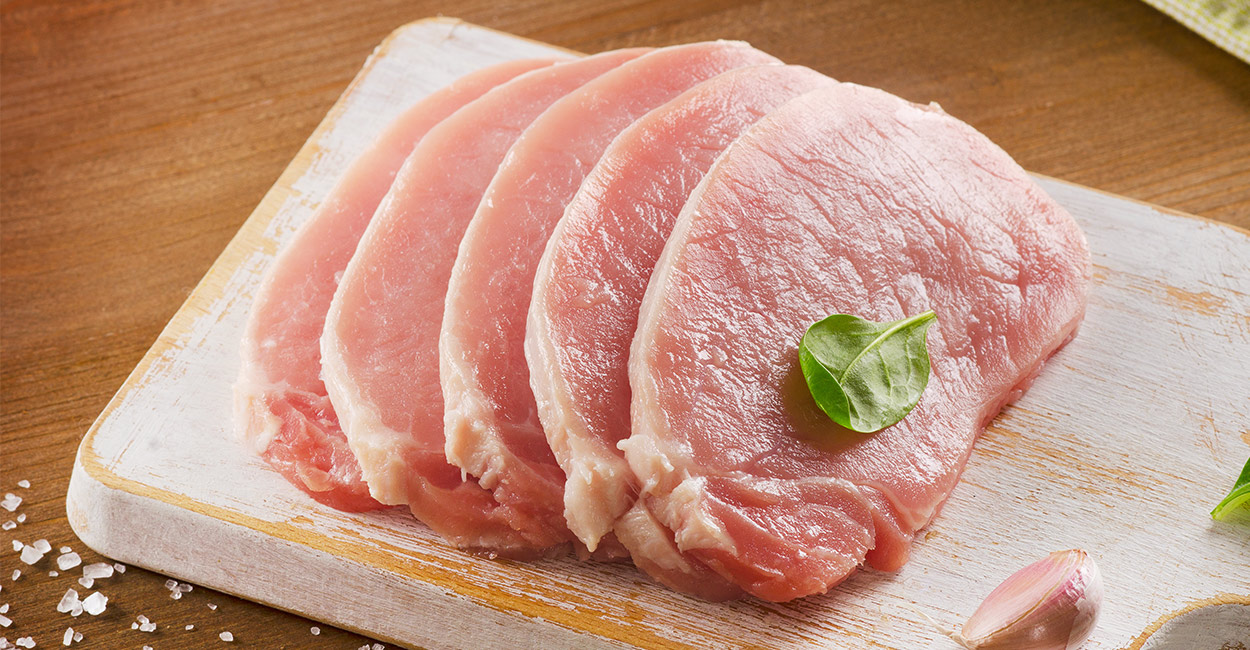
Health Benefits Of Pork For Dogs
Despite some beliefs, dogs are carnivores. This means that they are designed to get almost all of their nutrients and energy from meat. Furthermore, it has been found that the dietary preference of dogs is very similar to wolves. One study found that wolves have a nutrient preference for a diet with a protein-fat-carb ratio of 54:45:1. A different study found that the dietary ratio for dogs was 30:63:7.
As you can see, their preferred diets are quite similar. Both eat very few carbs and instead focus largely on protein and fats. But what does this mean when it comes to giving dogs pork? Well, pork matches this dietary preference pretty well. It mostly contains protein, but also has a decent amount of fat in it. Let's look at some of the vitamins and minerals pork contains and how they interact with your dog's diet. This will help us get a more complete picture.
Dogs And Vitamin C
Vitamin C is technically not a requirement in a dog's diet, as dogs can produce Vitamin C on their own. However, some research has shown that it can provide health benefits to sick or stressed dogs. Dogs who are chronically ill or stressed have exhibited lower than average amounts of vitamin C in their bloodstream. This hints at the possibility that these types of dogs regularly use vitamin C at a higher rate than healthy dogs.
Therefore, they may benefit from an increased amount of Vitamin C in their diet due to their increased use.
Dogs And B12
Pork is also a wonderful source of Vitamin B12. This vitamin improves the function of three types of enzymes. These enzymes would not be able to function properly without Vitamin B12. If these enzymes do not function properly, your dog's chance of developing hyperhomocysteinemia increases. This is a medical condition characterized by an abnormally high level of an amino acid in the blood called homocysteine. This amino acid plays a part in metabolism.
What Does This Mean For Dogs And Pork?
Simply put, as protein is broken down in the blood system, this amino acid is left behind. Vitamin B12 then transforms this amino acid into a usable form. This process does not occur correctly when a canine does not have enough B12. And this leaves homocysteine floating around in the blood. This abnormal level is associated with cardiovascular disease.
Pork clearly has nutrients that are very beneficial to canine health, however, these nutrients can be found in other foods as well.
How Can I Feed My Dog Pork?
If you want to include pork in your dog's diet, remember that it should only be in moderation. Your dog really shouldn't have pork as his main source of protein. However, pork can easily be made into homemade jerky using recipes such as this one, which makes a great occasional dog treat.
Always serve your four-legged friend cooked pork. To prevent the risk of choking it is best if you cut the pork up into bite sized pieces. Pork bones for dogs are never safe, so make sure you cut the meat off the bone before giving it to your dog. Seasonings and barbeque sauce can contain ingredients toxic to dogs, so be sure to feed your dog plain pork. Salt is not healthy for dogs either and a high sodium diet can cause many of the same health issues in dogs as it does in people. In fact, it can even be toxic and lead to some serious health problems, like kidney failure.
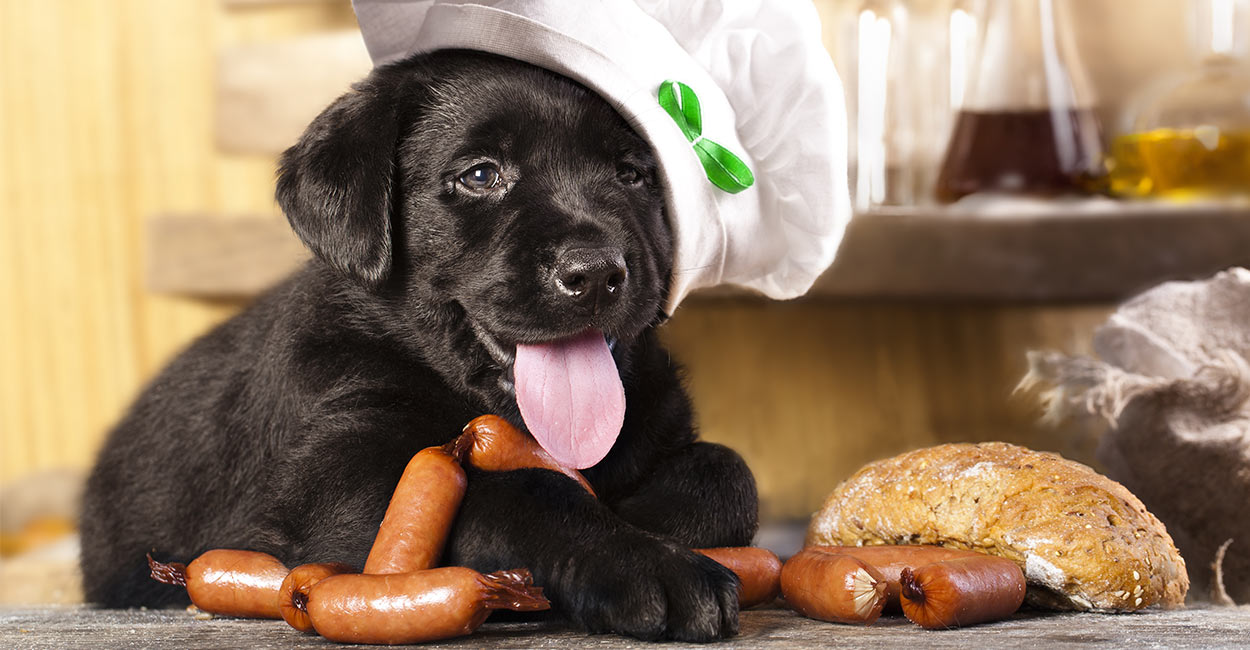

Does Dog Food Contain Pork?
Pork is generally not a common ingredient in most commercial dog foods. It's much more common to find chicken, beef, or fish. However, there are a few out there that may contain pork products. And there are also recipes that you can follow to make homemade dog food that includes pork protein.
Can Dogs Eat Pork? A Summary
Can dogs eat pork? Yes, pork is perfectly okay for your dog to eat on occasion. And can dogs eat pork bones or pork rib bones? Certainly not. These bones are dry and brittle once cooked and can splinter, resulting in serious damage to your dog's mouth or digestive tract.
If you do feed your dog pork, it is important that the pork is unseasoned and well-cooked. Seasoned or raw pork can cause serious health issues for your dog. Pork is high in fat and a high-fat diet can cause inflammation, pancreatitis, and other digestive problems. Keep the portions small and use pork as a special treat rather than a main staple in their diet.
Does your dog like pork? How do you prepare it? Let us know in the comments!
Readers Also Liked
- Can Dogs Eat Cheese, Or Is Cheese Bad For Dogs?
- Best Treats For Puppies
- Can Dogs Eat Tuna Fish: Is Tuna Good For Dogs?
- Can Dogs Eat Egg Shells?
References and Further Reading
- Bosch, G. et. al. 2015. "Dietary nutrient profiles of wild wolves: insights for optimal dog nutrition?" British Journal of Nutrition.
- Gebreselassie, E., and Jewell, D. E. 2019. " Metabolites." Federation of American Societies for Experimental Biology (FASEB).
- Hewson-Hughes, A. 2013. "Geometric analysis of macronutrient selection in breeds of the domestic dog, Canis lupus familiaris." Behavioral Ecology.
- Pet Poison Helpline. 2019. "Salt."
- Pork Checkoff. 2019. " Fun Facts About Pork History." National Pork Board.
- Medical News Today: Human Foods For Dogs
- SELF Nutrition Data. 2018. "Pork, fresh, variety meats and by-products, spleen, cooked, braised Nutrition Facts & Calories." Condé Nast.
- Steiner, J. "Cobalamin: Diagnostic use and therapeutic considerations." Gastrointestinal Laboratory.
- Stromberg, B. E. " Trichinellosis (Trichinosis) in Dogs." MSD Manual Veterinary Manual.
We have revised this article for 2021.

The Labrador Site Founder

Pippa Mattinson is the best selling author of The Happy Puppy Handbook, the Labrador Handbook, Choosing The Perfect Puppy, and Total Recall.
She is also the founder of the Gundog Trust and the Dogsnet Online Training Program
Pippa's online training courses were launched in 2019 and you can find the latest course dates on the Dogsnet website
Ok to Give Raw Baby Back Ribs to Dogs
Source: https://www.thelabradorsite.com/can-dogs-eat-pork/

0 Response to "Ok to Give Raw Baby Back Ribs to Dogs"
Post a Comment